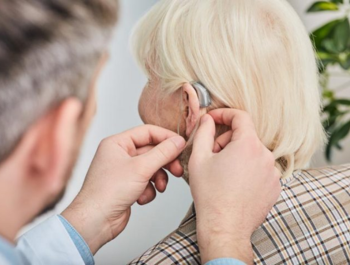Understanding Sudden Sensorineural Hearing Loss: What You Need to Know
20 May 2024
Have you ever experienced a sudden drop in your hearing ability? It can be quite alarming. This condition is known as sudden sensorineural hearing loss (SSHL), or sudden deafness, and it usually happens rapidly within a few days.
Sometimes wax can also cause a sudden non-permanent change in hearing - this can be easily removed by a qualified professional. This should not be confused with a SSHL.
What Is Sudden Sensorineural Hearing Loss?
SSHL is a rapid, unexplained loss of hearing in one ear. Unlike gradual hearing loss that comes with age or prolonged noise exposure, SSHL strikes quickly and unexpectedly, often catching people off guard.
What Causes SSHL?
In many cases, the exact cause of SSHL remains a mystery, making it an idiopathic condition. However, there are several known factors that could contribute to its onset, including:
- Viral Infections: Some viral infections can damage the inner ear.
- Autoimmune Disorders: The body’s immune system mistakenly attacks the inner ear.
- Inner Ear Disorders: Conditions like Meniere’s disease can lead to SSHL.
- Head Trauma: Injury to the head can affect hearing.
- Vascular Diseases: Blood flow issues can impact the inner ear.
- Ototoxic Medications: Some medications can damage the ear.
- Genetic Factors: A predisposition to hearing loss can run in families.
Recognising the Symptoms
The hallmark of SSHL is a sudden loss of hearing, typically in one ear. This might be accompanied by:
- Tinnitus: Ringing or buzzing in the ear.
- Dizziness: A feeling of vertigo or imbalance.
- Ear Fullness: A sensation of pressure or fullness in the affected ear.
If you experience any of these symptoms, it’s crucial to seek medical attention immediately. Early treatment can significantly improve the chances of recovery.
Diagnosing SSHL
If SSHL is suspected, an audiologist will perform a comprehensive evaluation. This typically includes:
- Medical History and Physical Examination: Understanding the patient’s health background.
- Audiological Tests: Pure-tone audiometry and speech audiometry assess hearing loss.
Onward referral to an Ear Nose and Throat Specialist for further evaluation, which may include;
- Imaging Studies: MRI or CT scans rule out other possible causes.
Treatment Options
Treating a confirmed SSHL involves an appointment with a medical professional (GP/ENT/Emergency Department) for potential medical interventions and rehabilitation strategies. Time is of the essence here, so prompt treatment is critical. Common treatments include:
- Corticosteroids: These medications reduce inflammation and swelling in the inner ear and can be administered orally, intravenously, or through injections.
- Other Medications: Depending on the suspected cause, other drugs might be prescribed.
- Rehabilitation: Hearing aids or assistive listening devices can help manage residual hearing loss.
What’s the Prognosis?
The outlook for SSHL varies. While some people regain their hearing completely, others may only experience partial recovery or none at all. The chances of a positive outcome are higher with prompt treatment. Rehabilitation and support can significantly improve the quality of life for those with lasting hearing loss.
Preventing SSHL
Since the exact cause of SSHL is often unknown, prevention can be challenging. However, maintaining good overall health, avoiding prolonged exposure to loud noises, and seeking immediate medical attention for any hearing changes can help mitigate risks.
Conclusion
Sudden sensorineural hearing loss is a rapid and unexpected condition that requires immediate attention. By understanding the potential causes and symptoms, and by seeking prompt medical care, individuals can improve their chances of recovery and better manage the impact of SSHL on their lives. If you or someone you know experiences sudden hearing loss, don’t hesitate—reach out to Bellbird Hearing right away.
Read more
 The sound of change: Bellbird Hearing.
The sound of change: Bellbird Hearing.
 Understanding Tinnitus: Breaking the Silence for Tinnitus Awareness Week.
Understanding Tinnitus: Breaking the Silence for Tinnitus Awareness Week.
 You are unique - your hearing solution should be too!
You are unique - your hearing solution should be too!
 Diabetes and Hearing Loss: Understanding the Connection
Diabetes and Hearing Loss: Understanding the Connection
 Tips for Enhanced Communication and Frequently Asked Questions
Tips for Enhanced Communication and Frequently Asked Questions
 Client testimonial - Tiffany
Client testimonial - Tiffany
 Self Help Guide for Tinnitus Relief Now Available Around the World
Self Help Guide for Tinnitus Relief Now Available Around the World
 Why do I need two hearing aids?
Why do I need two hearing aids?
 4 years of happy ears: Bellbird Hearing
4 years of happy ears: Bellbird Hearing
 Client Testimonial - Colin
Client Testimonial - Colin
 Personalised hearing support: Bellbird Hearing
Personalised hearing support: Bellbird Hearing
 Hear here: Bellbird Hearing
Hear here: Bellbird Hearing
 Track Testing Motorsport Earplugs at the SCOPE Classic
Track Testing Motorsport Earplugs at the SCOPE Classic
 Tips for hearing in background noise
Tips for hearing in background noise
 Communication Strategies
Communication Strategies
 Sound Solutions: Embracing the Future of Hearing Aids in 2023
Sound Solutions: Embracing the Future of Hearing Aids in 2023
 Keeping the hearing required to run a company - John Baker’s Story
Keeping the hearing required to run a company - John Baker’s Story
 Noise induced hearing loss
Noise induced hearing loss
 The Link between Hearing Loss and Dementia
The Link between Hearing Loss and Dementia
 Do you have itchy ears?
Do you have itchy ears?
 The gift of hearing
The gift of hearing
 Waxing lyrical about hearing
Waxing lyrical about hearing
 Hear to stay: Bellbird Hearing
Hear to stay: Bellbird Hearing